UK
Calls for open justice to be improved as Government praises riots court reporting
Journalists have been praised for ensuring that justice is being seen to be done in the wake of riots across England and Northern Ireland this month.
Since violence flared in towns and cities, police have moved swiftly to identify those involved and make arrests, while special courts have been set up to ensure cases are handled quickly.
The importance of local journalism in first covering events in real-time, and helping tackle disinformation fuelling the violence, has already been acknowledged by police forces and politicians.
Now the role of local media in ensuring people are seen to be prosectuted for their violent behaviour has been noted too.
Minister for Courts and Legal Services, Heidi Alexander, said: “I want to acknowledge and thank you and your colleagues in the media for the vital role you have played in recent weeks in upholding the principles of open justice and transparency.
“It’s important — now more than ever — that justice is not only being done, but that the public sees and hears about justice being done; that crime leads to punishment and that the consequences of criminal activity will apply, in spite of any wider challenges we face across the justice system.
“I’m fully aware of the unfailing work that goes on behind the scenes of every news story, as court reporters follow cases through the system, attend and observe court hearings in person or online, request and verify details before independently and accurately reporting court business, in real time, often to very tight deadlines.”
News Media Association director Sayra Tekin said: “Acting as the eyes and ears of the public, the media plays a critical role in upholding the principles of open justice.
“In recent days and weeks, the role of local and national media in reporting on the disorder in communities across the UK and the subsequent response of the courts has been crucial to keeping the wider public informed.
“We appreciate the government’s recognition of this and look forward to working with the new government to ensure open justice continues to be protected.”
It is now hoped the new Government will take steps to make it easier for local newsrooms to report on court.
Across the country, police forces operate different policies on when they will issue mugshots of those ultimately prosecuted, many of which have been paused to ensure maximum publicity for those convicted of riot-related offences.
In recent years, police have significantly reduced the amount of information they proactively release about crimes when committed, or about investigations leading to court cases.
Perhaps the most extreme example of this was Cheshire Police’s decision to produce its own documentary on Operation Hummingbird, the investigation into deaths at the Countess of Chester maternity unit, which ultimately led to the conviction of Lucy Letby.
Their decision to broadcast their own documentary on YouTube, rather than work with independent journalists as is normally the case, raised questions over accountability — even more so now a growing number of experts are beginning to ask question about Letby’s convictions.
Meanwhile, the closure of courts, particularly magistrates courts, has made it harder for newsrooms to track court cases. The time it takes cases to move through the system also poses challenges for newsrooms which are much smaller than they used to be.
All of these are issues the news industry is working with Government to attempt to resolve.
Journalists haven’t just been reporting on those convicted of violent offences — but those accused of inciting violence online.
The Northampton Chronicle and Echo this week reported the sentencing of Tyler James Kay, who called for people to burn down hotels holding asylum seekers in posts on Twitter.
Stoke On Trent Live reported on the sentencing of carer Julie Sweeney, convicted after posting that mosques shouldn’t be protected, but blown up.

No comments:
Post a Comment